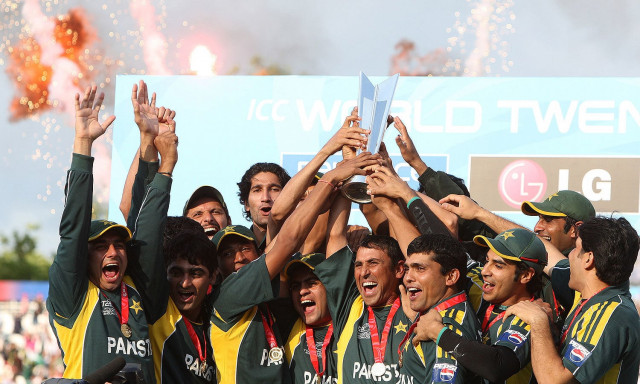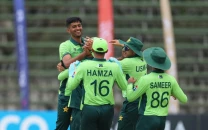When the 'unpredictables' lifted World T20 trophy
The tale of 2009 World T20 victory is of a team which played together as a unit

The Men in Green, known for pulling out anything except the rabbit out of the hat, did go into the 2009 World T20 with the same ‘unpredictable’ tag associated with them.
Pakistan cricket has a naughty child reputation: Ian Pont
The Younus Khan-led side started their pursuit of the silverware with a loss to England by 48 runs in their first Group B fixture — hence, displaying their volatility. However, a victory against Netherlands by an 82-run margin ensured a place in the last-eight.
 Sri Lanka outplayed Pakistan in Group stages but Pakistan avenged themselves where it all mattered. PHOTO: AFP
Sri Lanka outplayed Pakistan in Group stages but Pakistan avenged themselves where it all mattered. PHOTO: AFPOn the other side, in Group A, India won both their matches to top the group. In Group C, Sri Lanka were on top with two wins, while South Africa remained unbeaten in Group D.
2 B part of this special moment as a teenager is an honor n a v special memory close to my heart #PakistanZindabad🇵🇰 pic.twitter.com/oaPlUZ8Ck1
— Ahmad Shahzad 🇵🇰 (@iamAhmadshahzad) June 21, 2016
Pakistan were then pitted against Sri Lanka, New Zealand and Ireland in Group F. Meanwhile, South Africa, India, West Indies and England made it in Group E of the last-eight round.
Pakistan are as unpredictable as this headline. Potato
First up, Sri Lanka scored 150-7 after opting to bat first at Lord’s. Younus’ half-ton went in vain as seven Pakistani batsmen were accounted for without entering double figures. Shoaib Malik (28), Misbahul Haq (21) and Fawad Alam (12) were the only other batsmen to make petty contribution as Pakistan were beaten by 19 runs.
 Sanath Jayasuriya cups one. PHOTO: AFP
Sanath Jayasuriya cups one. PHOTO: AFPOnce again Younus and co faced a difficult situation. It was win all or go home for them but Umar Gul wasn’t ready to take the flight back home so soon. He stepped up with a five-for in three overs for only six runs – his career best T20I figures. Pakistan overcame the Kiwis who could only muster 99 runs; the former chased the target in 13.1 overs with six wickets remaining.
Off-spinner Saeed Ajmal then spun magic against the Irish as Pakistan emerged on top with a 39-run victory. Kamran Akmal was the man of the match for his 57 off 51 balls courtesy five boundaries and a maximum.
Younus Khan regrets leaving captaincy in 2009
 Kamran Akmal goes for a sweep. PHOTO: AFP
Kamran Akmal goes for a sweep. PHOTO: AFPThe next hurdle was once again a trial by combat. Under Graeme Smith’s captaincy, an unbeaten South African side stood in Pakistan and the final’s way. On the other hand, Sri Lanka faced a similar threat as West Indies walked into the semis with wins against India and England in their group.
From this point onwards, some still like to call it a team effort but most of the pundits agree that Afridi was only the difference between Pakistan and any other team that faced them.
 Afridi with his signature pose: PHOTO: AFP
Afridi with his signature pose: PHOTO: AFPA well-crafted 51 off 34 balls with eight boundaries, coupled with two important wickets of AB de Villiers and Herschelle Gibbs conceding only 16 runs off his four overs – the lowest economy of four runs per over in the match – was the story of the semi against the Proteas.
When Afridi shocked unbeaten Proteas single-handedly
Then, in the final against Sri Lanka where it all mattered, if only 20 runs off his four overs with a wicket to his name was not enough, Afridi led the team to the silverware with an unbeaten 54 off 40 balls hitting only two boundaries and two sixes — very unusual from his own standards.
 Afridi was ecstatic after leading his team to the World T20 title. PHOTO: AFP
Afridi was ecstatic after leading his team to the World T20 title. PHOTO: AFPPakistan etched their name on the winner's trophy with eight wickets and eight balls remaining.
 The sparkly in the eyes of Intikhab Alam. PHOTO: AFP
The sparkly in the eyes of Intikhab Alam. PHOTO: AFPThe tale of the 2009 World T20 victory is not that of Afridi or Gul or Ajmal. The point remains that the team played together as a unit; they backed each other, strengthened the weak links and when a defeat came they struck back harder and that is what champions are meant to do, stand up stronger after taking a fall.


















COMMENTS
Comments are moderated and generally will be posted if they are on-topic and not abusive.
For more information, please see our Comments FAQ